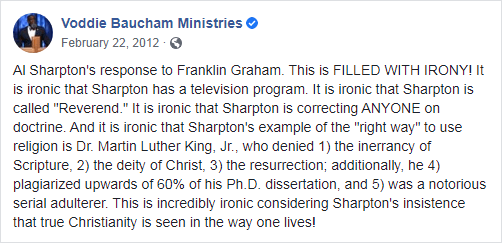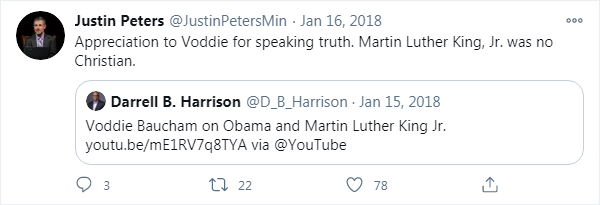MLK: Liberal Marxist Heretic?
Dr. Voddie Baucham in a Facebook post has published the following list of serious deviations from Christian orthodoxy and Christian standards of morality maintained by Martin Luther King, Jr.:
- He denied the inerrancy of Scripture
- He denied the deity of Christ
- He denied the resurrection
- He plagiarized upwards of 60% of his PhD dissertation
- He was a notorious serial adulterer
Baucham has also identified King as a gospel-denying liberal Marxist (source):
"There was a man who has a monument now in Washington, D.C.—that man was a neo-Marxist and a socialist and a pastor and a tremendous orator, and his name was Dr. Martin Luther King, Jr. He was wrong on the gospel, and he was wrong on worldview—as a liberal Marxist socialist—but he left a tremendous legacy."
Voddie Baucham
Agreeing with Baucham's statements, Justin Peters asserted on Twitter the following:
"Martin Luther King, Jr. was no Christian."
Justin Peters
Several quotes by King from his paper What Experiences of Christians Living in the Early Christian Century Led to the Christian Doctrines of the Divine Sonship of Jesus, the Virgin Birth, and the Bodily Resurrection are provided below, which appear to substantiate the charges of heresy raised against him.
Divine Sonship of Christ
King identifies the origin of the doctrine of the divine sonship of Christ not in divine inspiration, but in the exposure of early Christians to the philosophy of Greek thought:
The first doctrine of our discussion, which deals with the divine sonship of Jesus, went through a great process of development. … How then did this doctrine of divine sonship come into being? We may find a partial clue to the actual rise of this doctrine in the spreading of Christianity into the Greco-Roman world. … We must remember that the Logos concept had its origin in Greek thought. It was only natural that the early Christians, after coming in contact with the Greeks, would be influenced by their thought.
Martin Luther King, Jr.
The Virgin Birth of Christ
The second doctrine in our discussion posits the virgin birth. This doctrine gives the modern scientific mind much more trouble than the first, for it seems downright improbable and even impossible for anyone to be born without a human father. … First we must admit that the evidence for the tenability of this doctrine is too shallow to convince any objective thinker. To begin with, the earliest written documents in the New Testament make no mention of the virgin birth. Moreover, the Gospel of Mark, the most primitive and authentic of the four, gives not the slightest suggestion of the virgin birth. The effort to justify this doctrine on the grounds that it was predicted by the prophet Isaiah is immediately eliminated, for all New Testament scholars agree that the word virgin is not found in the Hebrew original, but only in the Greek text which is a mistranslation of the Hebrew word for "young woman." … For his early followers … were not unscientific in their approach because they had no knowledge of the scientific. They could only express themselves in terms of the pre-scientific thought patterns of their day. … We of this scientific age will not explain the birth of Jesus in such unscientific terms, but we will have to admit with the early Christians that the spiritual uniqueness of Jesus stands as a mystery to man.
Martin Luther King, Jr.
The Resurrection of Christ
The last doctrine in our discussion deals with the resurrection story. … From a literary, historical, and philosophical point of view, this doctrine raises many questions. In fact, the external evidence for the authenticity of this doctrine is found wanting.
Martin Luther King, Jr.

